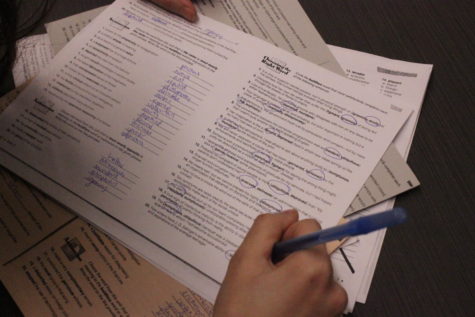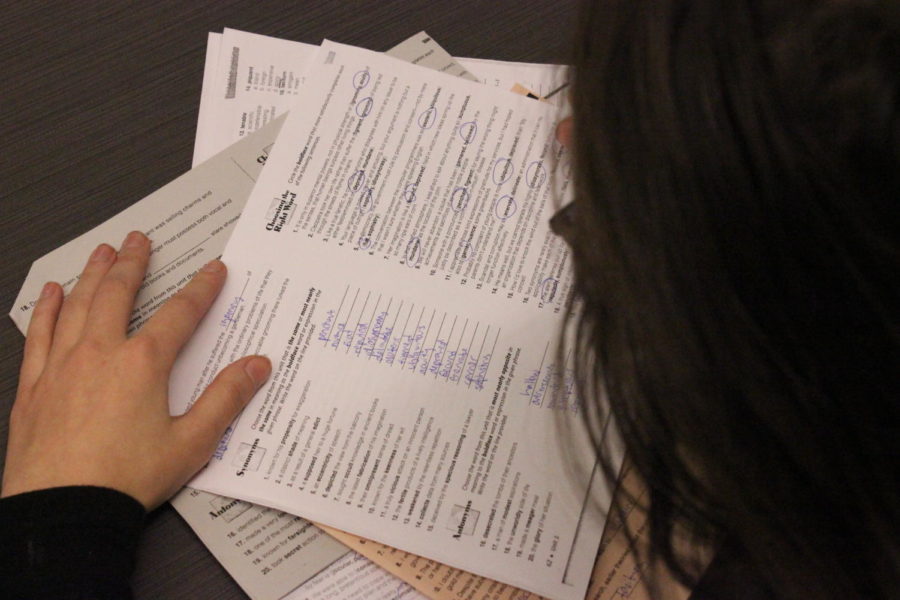Vocab (n): pointless, useless
Vocabulary packets given in English classes are not only tedious, but meaningless too
A student fills out vocabulary practice problems for an assignment. These packets can present unnecessary stress for students with scare use for the words.
Sitting in freshman English, the class groans as the teacher passes out the doomed double-sided horizontally stapled pages. The anxiety and apprehension begins begins to grow; you know what this means. This week, you’re going to have to spend precious time memorizing 20 pointless, random words that you’ve never heard of and are never going to use.
The students of Grand Haven High School are disturbingly familiar with the vocabulary packets handed out in English class. It doesn’t matter if you are in required freshman English or AP literature – the dread is universal.
Roughly twice a month, students are given a packet filled with 20 words and required to memorize all aspects of the words – including syllable emphasis, synonyms, antonyms, spelling, and part of speech – for a quiz.
The student then promptly forgets everything about the word, until they have to relearn everything for the final exam.
Let’s be honest here: how many kids actually use or even remember any of the words we receive in English class?
The answer: hardly any.
Studying language to cram for a quiz instead of actual application is pointless because students end up forgetting all the material. But linguistics is too important an aspect of education to abandon. Instead of memorizing, teachers ought to teach vocabulary to students in ways in which they can apply their knowledge.
The best way to do this is through the teaching of Greek and Latin roots. But don’t take my word for it, take the evidence.
The evidence is that 60% of the English language is borrowed from Greek and Latin.
Knowing the definition of prefixes, suffixes, and roots and being able to apply that to the word as a whole has been more useful to me than the hundreds of words I have been forced to memorize via packets.
For instance, take the word anomaly. This word is less common and the definition would be unknown for most high school students. However, by applying knowledge of the Greek prefix -a (meaning not), and the Greek root – homalos (meaning even), one is able to synthesize the meaning of anomaly; defined as unevenness; deviation from the common floor.
This technique is easily applied to standard tests like the ACT and SAT. It is impossible to know, and unreasonable to memorize all the vocabulary that would appear in these circumstances. However, by applying root definitions, it is possible to gain a general idea of the definition of the word and understand it enough to do well.
In the first two years of medical school, you will be required to memorize countless vocabulary words, 75% of which Greek origin. Wouldn’t it be easier if your teachers had prepared you to learn these words by memorizing their roots?
Simple answer: it would.
If you want to become a computer science, lawyer, or teacher, memorize roots.
If you just want to sound a little smarter or learn words faster, memorize roots.
If you want to improve your overall SAT score, memorize roots.

If a school is encouraging its students how to memorize, copy worksheets, or cheat, vocab quizzes vocab tests are the way to go.
But I have a feeling that’s not the goal.
In memorizing parts of difficult words that will never be used in ordinary context, students are taught nothing.The idea of vocab packets seems smart, but in reality they’re just busywork. But when taught roots of words, students are given the capability to apply their learning in a meaningful way that will prepare them for the rest of life.

Senior Grace Ostric is excited for her 2nd year on The Bucs’ Blade. This year she hopes to create a successful team of journalists within the classroom....

Editor In Chief and senior, Camille Berko, is thrilled to contribute to The Bucs’ Blade for one final year. She joined as a sophomore and hopes to help...







